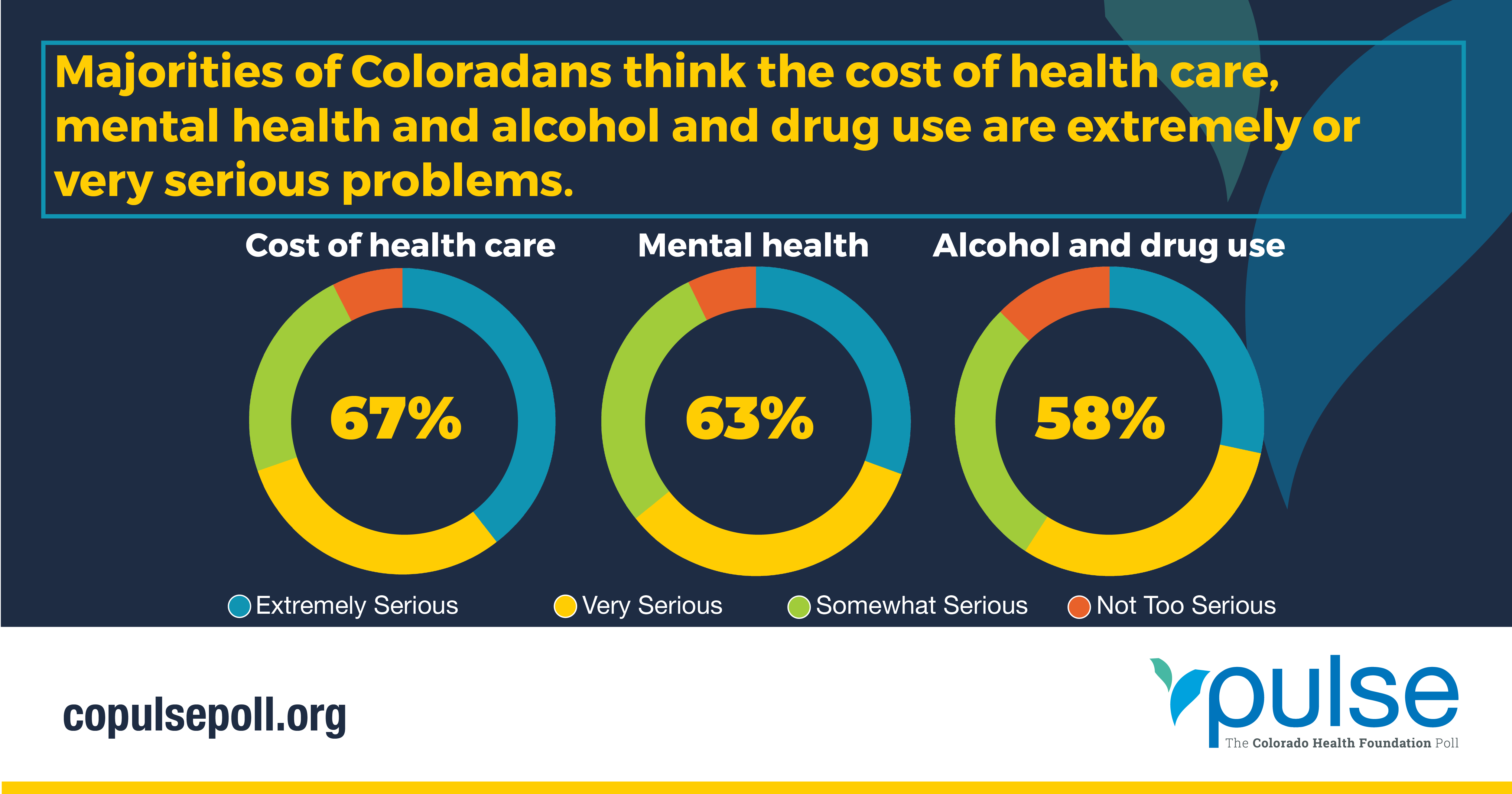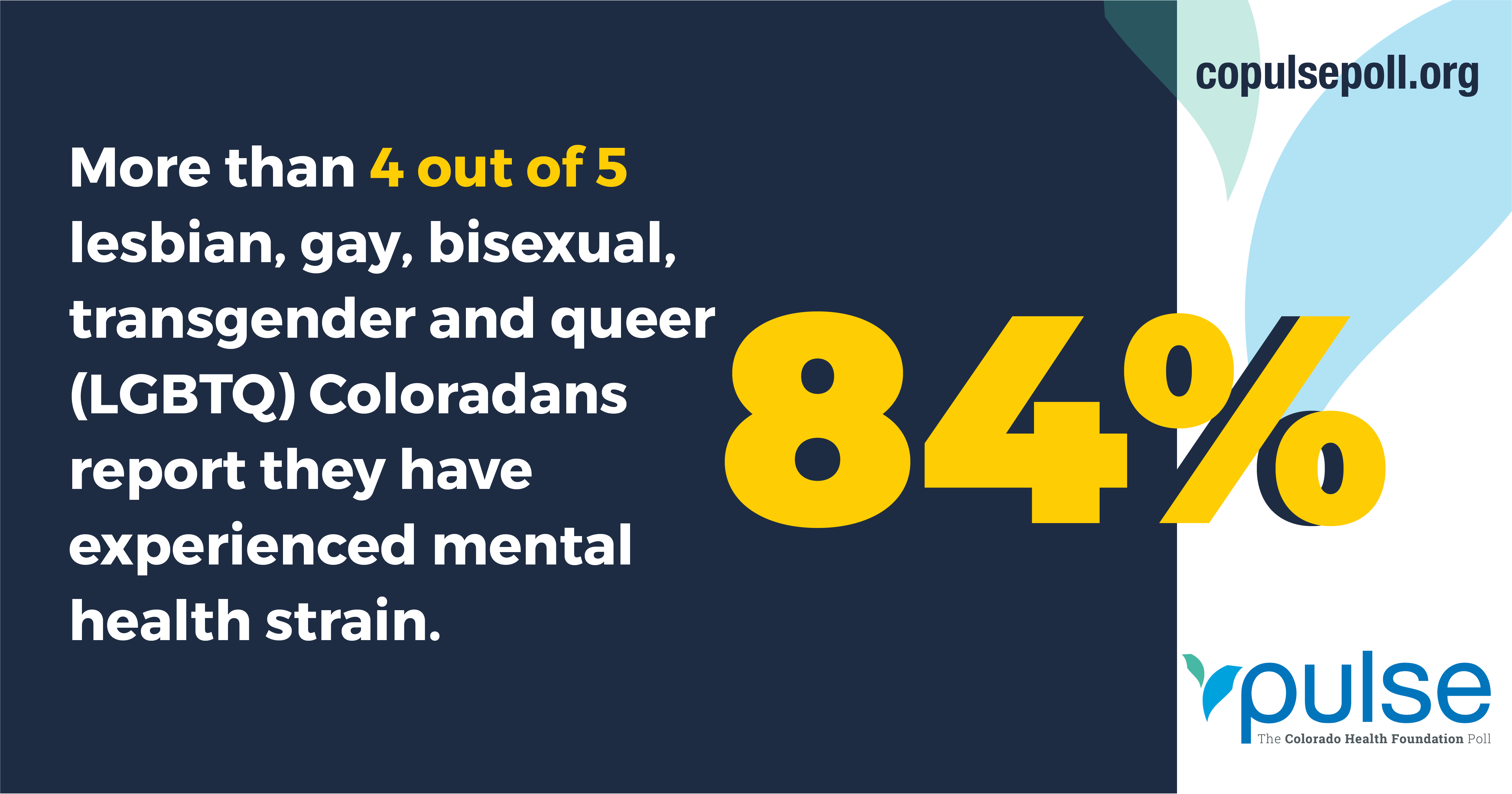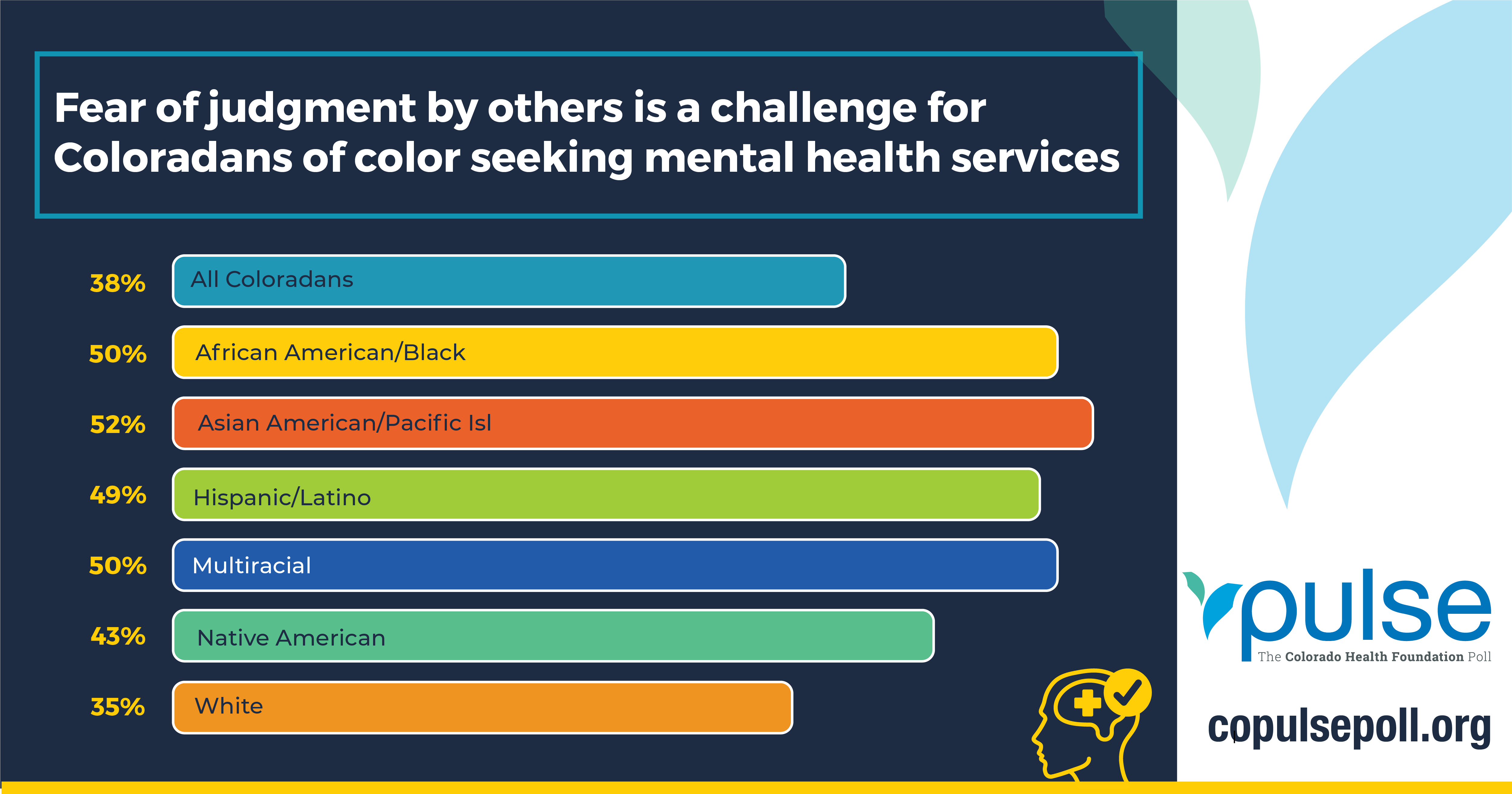Pulse: The Colorado Health Foundation Poll is being released in phases. If you missed the first phase focused on the increasing cost of living and cost of housing, you can catch up here. Below, we dig into Coloradans’ view on health and well-being.
In January 2022, we asked Colorado Health Foundation grantees and partners to tell us what topics to explore in this year’s Pulse: The Colorado Health Foundation Poll. Overwhelmingly they said “mental health.”
Mental health isn’t the easiest thing to ask about in a poll, even one that simply seeks to listen to Coloradans and learn about their worries and priorities. There are concerns about stigma and privacy – people not wanting to talk about their mental well-being for any number of reasons.
But our partners in communities across the state know better than most what’s going on in the lives of Coloradans, and if they said we needed to explore mental health, we knew we should figure it out. So we did.
Pulse 2022 asked questions about mental health, health care and alcohol and drug use – and the results are staggering.
As the economic pressures on Coloradans have grown, concerns about COVID-19 have moved to the background. But despite entering a new phase of the pandemic, challenges to people’s health and well-being haven’t disappeared. Findings from our poll demonstrate that the cost of health care remains a problem for a majority of Colorado residents; the mental health strain that may have been attributed to COVID-19 lingers; and alcohol and drug use is an increasing issue across the state.
Health and well-being are top concerns for people in the state.

When asked to rank a series of problems facing Colorado, respondents place concerns related to health and well-being second to increasing cost of living and housing. Cost of health care, mental health and drug and alcohol use are all seen as extremely or very serious problems by 67%, 63% and 58% of respondents respectively.
- The cost of health care and mental health have been consistent concerns for Coloradans with about two-thirds naming it as a problem in 2021 and 2022.
- Concern about alcohol and drug use is increasing; in 2020, 45% of Coloradans considered it a serious problem; in 2021, it was 50%, and in 2022, a majority of respondents (58%) say it’s a problem.
More than one-third of Coloradans are worried about losing insurance coverage.
About two-thirds of Coloradans say the cost of health care is a problem, but cost isn’t the only challenge facing respondents. Almost four-in-10 (37%) Colorado residents are worried that they or someone in their household will be without health insurance – up from 27% in 2021.
- A majority (56%) of people with Medicaid are worried about losing their insurance, and more than three-in-four (76%) uninsured Coloradans are worried they’ll remain without it.
- About half of lesbian, gay, bisexual, transgender and queer (LGBTQ) Coloradans (49%) and people with disabilities (45%) are worried they’ll be without health insurance in the next year.
- Immigrants and those who speak a language other than English at home are more likely to be worried about losing health insurance at 49% and 45% respectively.
Almost half (48%) of people of color are worried about not having insurance, but that’s not the only worry they’re carrying. Many Coloradans of color say they – or someone they know – have been treated unfairly because of their race or ethnicity when seeking health care services: 52% of Native Americans, 32% of African American respondents, 31% of multiracial Coloradans, 27% of Latinos and 19% of Asian Americans and Pacific Islanders (compared to 18% of White people). About one-in-five (21%) of all respondents say they – or someone they know – were treated unfairly because of race or ethnicity when seeking health care.

People are delaying much-needed care.
In 2022, 45% of Coloradans say they’ve postponed medical or dental care in the last 12 months – an increase from 38% in 2021. There are many reasons why someone might postpone care:
- Lack of insurance: 65% of uninsured Coloradans and 64% of those who are worried about not having insurance postponed care.
- Fear of racial bias: 65% of those who experienced or know someone who has experienced unfair treatment when seeking health care postponed medical or dental care.
- Financial instability: 78% of people who skipped meals because they couldn’t afford food also postponed medical or dental care.
Mental health concerns impact some more than others.
In 2020, a majority (53%) of Pulse respondents said they had experienced increased mental health strain – right in the midst of the earliest, most difficult days of the pandemic. Now two years later, schools and businesses are open, vaccines are readily available and the economy is growing again – but mental health strain remains. In 2022, 61% of Coloradans say they have experienced mental health strain such as anxiety, depression, loneliness or stress in the last year.
Mental health strain is not impacting all Colorado residents equally:
- Financial insecurity often exists alongside mental health strain: 72% of those living on low income are experiencing it.
- Unfair treatment because of race and ethnicity has lasting impacts: 74% of those who were treated unfairly in health care settings say they’re experiencing mental health strain.
- Working and taking care of kids can be stressful: 66% of people who are employed full time and 65% of parents are experiencing mental health strain.

Access to mental health care remains a challenge.
Even when Coloradans are trying to find help, there are many challenges to accessing mental health care, according to respondents who are experiencing emotional strain like anxiety and depression. The challenges include:
- Expensive, out of pocket costs: 66% of all Coloradans and 77% of uninsured people say costs were a challenge.
- Inability to find appointments: 57% of all Coloradans and 66% of young people aged 18-29 say there were no available appointments or the wait was too long.
- Difficulty finding a mental health provider: 50% of all Coloradans and 68% of Asian Americans and Pacific Islanders say they were unsure how to find a provider.
- Lack of providers with the right experience: 50% of all Coloradans, 59% of people with disabilities and 62% of LGBTQ people say it was a challenge to find a mental health provider who would be understanding of their background or experiences.
- Concerns about privacy: 42% of all Coloradans, 51% of people who speak a language other than English at home and 63% of Eastern Plains residents say it was a challenge having to disclose personal information.
- Fear of judgment: 38% of all Coloradans, 52% of Asian Americans, 50% of Black respondents, 50% of multiracial people and 49% of Latinos say they had concerns about being judged by family members, friends or coworkers.

The most likely Coloradans to experience mental health strain and to report facing challenges accessing mental health care include LGBTQ Coloradans and young people (ages 18-29).
Concerns about alcohol and drug use rise.
Coloradans are more and more concerned about alcohol and drug use in the state; since 2020, there’s been a 13% increase in the number of people saying it’s an extremely or very serious problem. More than 1-in-10 (13%) respondents say that the amount of alcohol or drugs they consume has increased in the past year, and 13% also say they’ve felt worried about the amount of alcohol or drugs they consume. Among those who have increased their use, 44% feel worried about it.
- About one-quarter of LGBTQ Coloradans have increased their consumption (24%) and are worried about how much they use (25%).
- One-in-five young people (20%) have increased the amount of alcohol and drugs they consume and are worried about how much.
- Mental health strain can sometimes co-exist with alcohol and drug use: 17% of those with mental health strain say they’ve increased how much alcohol or drugs they consume.
People see many policy changes as effective ways to address these concerns.
Almost all Coloradans agree that costs and accessibility of health care and mental health services are among the most pressing issues facing the state. And an increasing number also agree that drug and alcohol use is a rising concern. A majority of Democratic, Independent, and Republican respondents believe the following actions would offer effective solutions for improving mental health in Colorado:

Interested in more detail?
All the questions we asked on health, well-being and drug and alcohol use are now available. Results for all respondents are here, and crosstabs that allow you to explore different subgroups are here.
Previously-released findings regarding increased cost of living and housing are available here.
Our full analysis of all survey data will be available on June 21, along with an interactive data dashboard that will allow you to dig into the questions that interest you the most.
